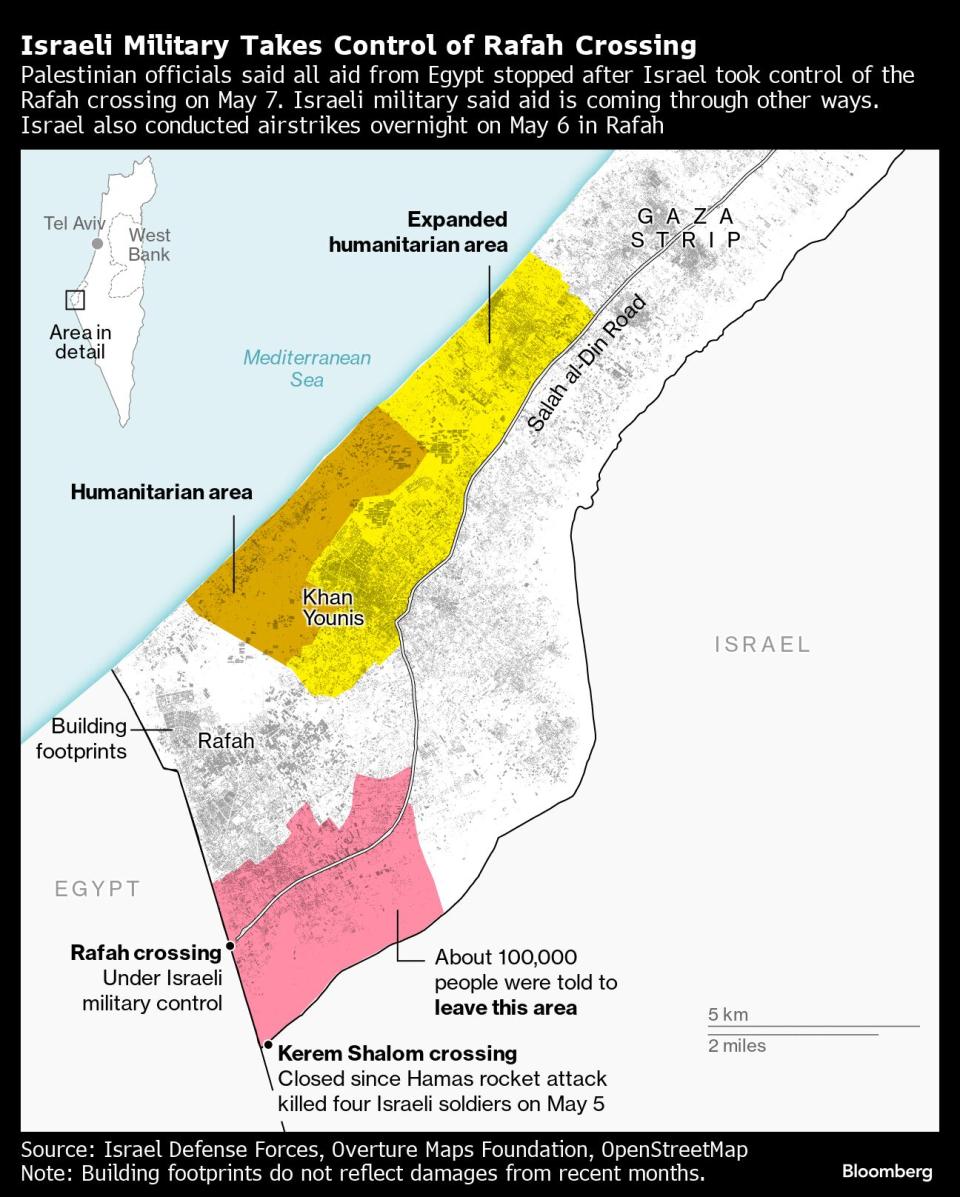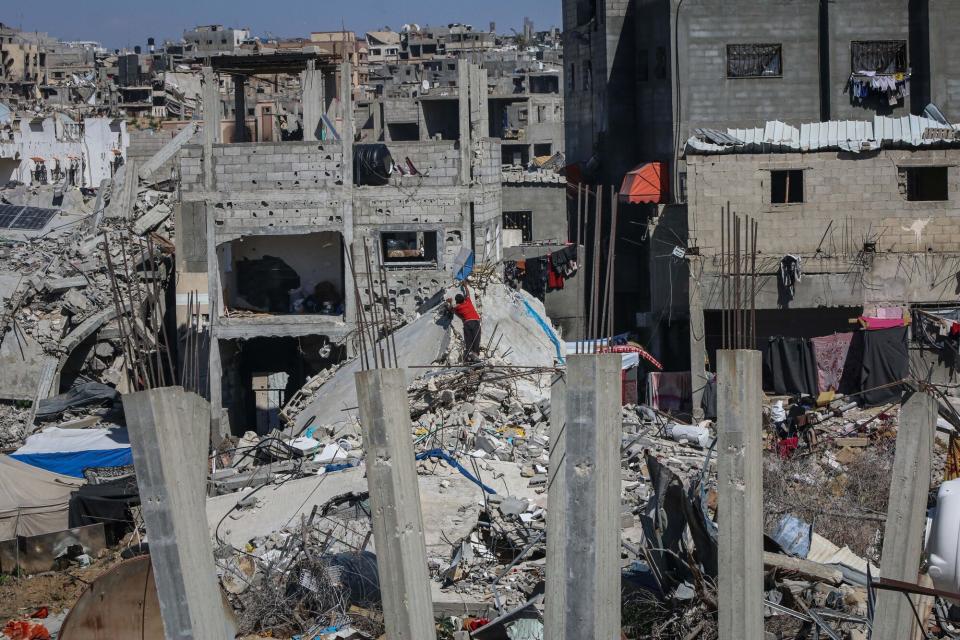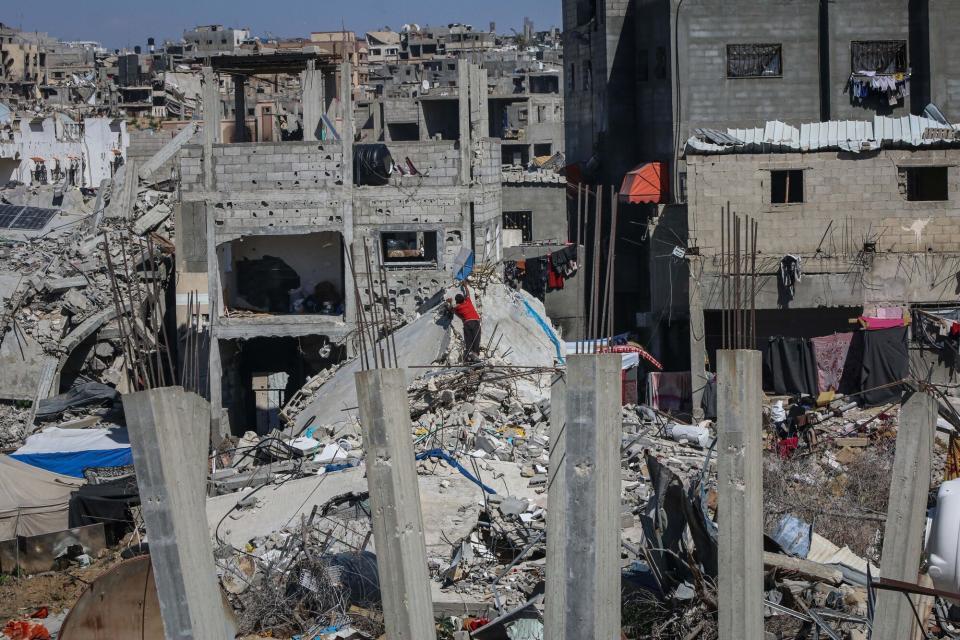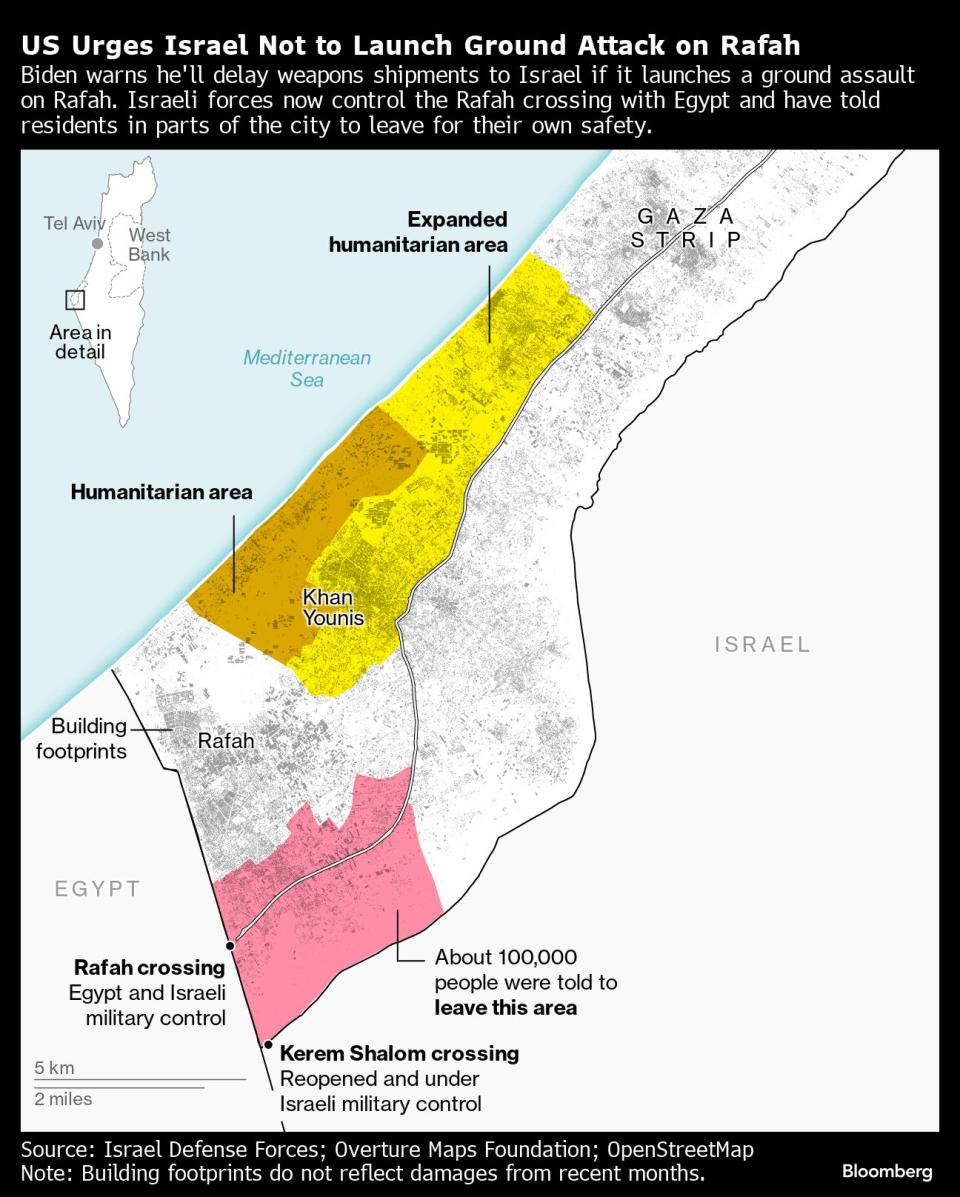Biden Warns He’d Delay More Weapons If Israel Attacks Rafah
(Bloomberg) -- US President Joe Biden said he would halt additional shipments of offensive weapons to Israel if the country launches a ground invasion of Rafah, decrying the potential loss of civilian life as “just wrong.”
Most Read from Bloomberg
“We’re going to continue to make sure Israel is secure in terms of Iron Dome and their ability to respond to attacks that came out of the Middle East recently,” Biden said in an interview with CNN, referring to air-defense weaponry. “But it’s just wrong. We’re not going to supply the weapons and artillery shells.”
The remarks came after the US paused delivery of about 3,500 bombs to Israel — including 2,000-pound (900-kilogram) explosives that could cause massive damage in the densely packed southern Gaza city of Rafah — amid mounting frustration over Prime Minister Benjamin Netanyahu’s conduct of the war against Hamas. The move marked the Biden administration’s most serious signal of displeasure since the conflict began seven months ago.
“Civilians have been killed in Gaza as a consequence of those bombs and other ways in which they go after population centers,” Biden said.
Netanyahu hasn’t publicly responded, though is due to give an interview to US TV to be broadcast later Thursday. Some members of his coalition government were more outspoken, with Itamar Ben Gvir, the far-right national security minister, using a heart emoji to describe the relationship between Biden and Hamas.
Finance Minister Bezalel Smotrich said Rafah should be attacked and “the sooner the better,” while Defense Minister Yoav Gallant said Israel “cannot be subdued — we will achieve our goals in the northern and southern arenas.”
Read more: US Arms Delay to Israel Brings Anxiety and Talk of Self-Reliance
US State Department spokesman Matthew Miller said the US is reviewing “other potential weapon systems.” A congressional aide and an administration official, who asked not to be identified discussing private deliberations, said another pending arms sale has been under review for months — a potential $260 million deal between Boeing Co. and Israel for as many as 6,500 tail-kits to convert unguided bombs into GPS-guided Joint Direct Attack Munitions.
As tension mounts, Biden administration officials and former officials said the moves have a clearly defined goal: exert as much pressure as possible on Israel to scale back or abandon an invasion of Rafah while being careful not to make a total break with Netanyahu’s government. More than 1.4 million civilians have taken refuge in the Gazan city near the border with Egypt, having fled a mass bombardment by the Israeli military further north.
Read More: Why Israel’s Plans to Invade Rafah Are So Worrying: QuickTake
The administration also wants to preserve space for negotiators from the US, Egypt and Qatar, who have convened in Cairo this week to strive for a cease-fire and hostage deal between Israel and Hamas. Officials in those talks include Central Intelligence Agency Director William Burns, who is trying to bring home a deal whose prospects have whipsawed between hopeful and grim.
Read more: Gaza Is China’s New Wedge Issue to Split US From Global South
“The pause in arms shipments should not be read as a major break in the relationship,” said Mara Rudman, who held senior Middle East diplomatic roles in the Obama and Clinton administrations and is now a professor at the University of Virginia. “Consider it as an element in the mix at a key inflection point — maximizing efforts to reach a cease-fire that brings out hostages, brings in humanitarian relief and starts to build a pathway to greater sanity all around.”
Cease-Fire Talks
The sides seemed close to a deal at the weekend but the core dispute — Hamas’ desire to make the truce permanent and Israel’s that it be temporary — got in the way.
As Israel started moving tanks toward Rafah, Hamas announced on Monday it had accepted an Egyptian proposal. But Israeli officials examining the document said it became clear a number of unacceptable changes had been included.
Hamas was no longer offering only living hostages in the first phase but an unspecified mix, while slowing down the pace of releases and increasing the number of Palestinian prisoners wanted in return. The group also baked into the deal that Israeli forces had to leave permanently before it got most of its hostages back.
The offer was rejected, and talks continue.
Read More: Israel Edges Into Rafah With Tension High Over Stalled Talks
It all comes at a critical juncture in the conflict, which has raged since Hamas militants invaded Israel on Oct. 7, killing about 1,200 people and abducting 250 more. Biden is facing domestic pressure for a solution with US elections just six months away, and Israeli strikes on Rafah have the potential to significantly increase the number of civilian casualties — and even scuttle cease-fire negotiations entirely.
Israel has insisted it needs to complete its mission to destroy Hamas, designated a terrorist organization by the US, both in retaliation for Oct. 7 and to prevent a future attack.
The US has stepped up its criticism of Israel in recent months, saying it’s not doing enough to protect civilians and allow aid into the besieged Palestinian territory, parts of which the United Nations says are on the verge of famine. “There have been far too many casualties in this battle space,” Defense Secretary Lloyd Austin said in congressional testimony Wednesday. Israel’s bombardment and ground offensive in Gaza have killed almost 35,000 people, according to the Hamas-run health ministry.
Biden’s decision on arms deliveries was immediately assailed by the Israelis, who privately expressed deep frustration to the US, according to a person briefed on the discussions. Republican lawmakers in Washington were similarly critical, accusing the administration of sending the wrong message to Hamas and other Iran-backed militant groups such as Hezbollah.
The pauses “call into question your pledge that your commitment to Israel’s security will remain ironclad,” Senate Minority Leader Mitch McConnell and House Speaker Mike Johnson said in a joint letter to Biden Wednesday.
US officials have signaled they would accept a more surgical, targeted campaign on Rafah, where Israel believes thousands of Hamas fighters are holed up. Biden told CNN that Israel’s actions in the city — including air strikes near border areas — had not yet crossed the line.
“They haven’t gone into the population centers. What they did is right on the border,” he said.
Biden told Netanyahu last month, following the killing of World Central Kitchen aid workers in an Israeli strike, that ongoing US support for the war would depend on new steps to protect civilians.
Read more: Understanding the Roots of the Israel-Hamas War: QuickTake
“I’ve made it clear to Bibi and the war cabinet: They’re not going to get our support, if in fact they go on these population centers,” Biden said Wednesday, referencing the Israeli prime minister’s nickname.
The US also stopped far short of halting all military aid to Israel. The US recently signed a foreign-aid package that contains billions of dollars of fresh assistance for Israel. The paused bomb shipment isn’t connected to those funds, Austin said. Arms transfers that are under review were drawn from previously appropriated money, and the White House is committed to ensuring Israel gets all the new national security aid, he said.
Other developments that could strain the US-Israel relationship include a government memorandum due this week that outlines whether the US believes Israel violated international humanitarian law in Gaza, according to Gerald Feierstein, a veteran US diplomat who’s now a senior fellow at the Middle East Institute.
“We still see the administration not being willing to risk an open break or an open confrontation with the Israelis,” he said. “A lot of it just depends on how things play out in Rafah and whether it gets worse.”
--With assistance from Tony Capaccio and Erik Wasson.
(Updates with Rafah refugees in eigth paragraph.)
Most Read from Bloomberg Businessweek
‘The Caitlin Clark Effect Is Real,’ and It’s Already Changing the WNBA
‘It’s a Money Loser’: Tax Breaks for Data Centers Are Under Fire
©2024 Bloomberg L.P.






